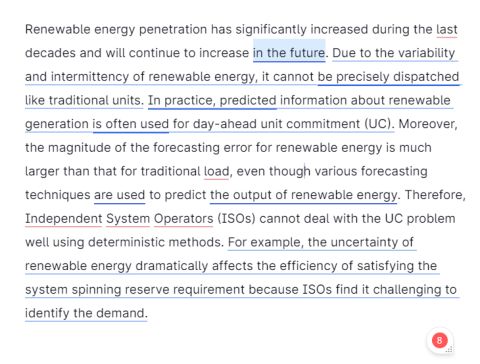当前对于工程或者基础科学等学科来说,我认为期刊编辑完全不必过于担心ChatGPT产生的影响。
比如我在之前的一个回答里面,提到了我的学生写的Introduction的第一段
Renewable energy penetration has significantly increased during the last decades and will continue to increase in the future. Due to the variability and intermittency of renewable energy, it cannot be precisely dispatched like traditional units. In practice, predicted information about renewable generation is often used for day-ahead unit commitment (UC). Moreover, the magnitude of the forecasting error for renewable energy is much larger than that for traditional load, even though various forecasting techniques are used to predict the output of renewable energy. Therefore, Independent System Operators (ISOs) cannot deal with the UC problem well using deterministic methods. For example, the uncertainty of renewable energy dramatically affects the efficiency of satisfying the system spinning reserve requirement because ISOs find it challenging to identify the demand.
那我之前的回答里面,也分析了这里面存在的逻辑问题:
然后有朋友
帮我试了一下ChatGPT直接润色:The penetration of renewable energy sources has seen a marked increase in recent years and is expected to continue to grow. However, the inherent variability and intermittency of these sources pose a challenge to their precise dispatch, unlike traditional energy sources. In practice, day-ahead unit commitment (UC) is typically based on predicted information about renewable energy generation. Despite various forecasting techniques being employed, the magnitude of forecasting error for renewable energy is still significantly larger than that of traditional load. As a result, Independent System Operators (ISOs) face difficulties in managing the UC problem using deterministic methods. For instance, the uncertainty of renewable energy has a significant impact on the efficiency of satisfying system spinning reserve requirements, making it difficult for ISOs to accurately predict demand.
读上面这段话呢,反正读起来每句话确实更通顺了,但是逻辑上的问题其实依然存在。
然后我的学生就直接和ChatGPT说,你看,你得注意注意逻辑,ChatGPT甚至还搞得多了一段话:
🌟Renewable energy’s rapid rise over the decades 🌟, with forecasts indicating an even greater expansion in the years ahead, is a game-changer for power systems. However, the inherent traits of these sources – their unpredictability and sporadic availability – present a complex issue when it comes to matching supply with demand like traditional energy does. ISOs, key players in grid management, heavily rely on predicted data to strategize day-ahead unit commitment decisions due to the inherent uncertainty in renewable output. 🤝Addressing this challenge is crucial for a smooth and sustainable energy transition.
The large forecasting errors for renewable energy generation, which are typically much higher than for traditional load, present a challenge for ISOs in effectively utilizing deterministic methods to address the UC problem. This uncertainty also significantly impacts the efficiency of satisfying system spinning reserve requirements, as ISOs struggle to accurately predict demand.
🌟当然,语言的流畅性是提升文章吸引力的关键,但对于学术严谨性来说,清晰的故事叙述和逻辑结构至关重要。📚学生深谙此道,他们遵循我的指导,巧妙地调整了思路,然后诚恳地寻求ChatGPT的帮助。经过一番打磨,他们的论述现在更为精准且连贯。📝ChatGPT的智慧在此得到了充分展现,它不仅修正了语法错误,还确保了信息的有效传递。🏆每一次成功的修改都是对学术素养的一次升华,让我们期待他们未来更出色的表现!
Unit commitment (UC) is a classical procedure often performed by Independent System Operators (ISOs) in the deregulated electricity markets. The objective of UC is to determine a generator dispatch schedule that minimizes system costs while meeting forecast demand and considering various constraints. Although the UC problem has been extensively studied in the literature, it now faces a new challenge brought by the high penetration of renewable energy. As renewable energy sources (RESs), such as wind and solar, are known for their variability and intermittency, the magnitude of forecasting error for renewable energy generation is much larger than that for traditional loads. The large forecasting error will brings more significant uncertainty to the UC problem, making solving the UC problem even harder.
这一段,现在读起来,逻辑也相对通畅了,语言也还不错。我整体上还是相对满意的。
🌟未来的AI发展趋势,无疑是向着”人类参与反馈”(Human in the loop)或高度互动的模式演变,人与机器各自发挥所长,携手共创。在这个过程中,虽然机器看似扮演辅助角色,但实际上它也可能成为激发创新灵感的重要驱动力。🌍
这是大势所趋,就像题目中那位编辑说的,“宜疏不宜堵”。
一篇论文是否能发表,本质上,还是要经过同行评价,这个过程通常更看中的就是所谓的创新性。我想,只要有一定的创新性,又和已有文献没有什么重复,不涉及抄袭,大可以把心态放得更开放一些。
而上面这个例子也说明,至少在当前ChatGPT的水平,想要直接用它写一篇能够让所有审稿人都认可有创新性的文章,那还是没有什么希望的,毕竟,现在连数也不一定能完全算对哈,哈哈哈。

AI时代,掌握AI大模型第一手资讯!AI时代不落人后!
免费ChatGPT问答,办公、写作、生活好得力助手!
扫码右边公众号,驾驭AI生产力!





